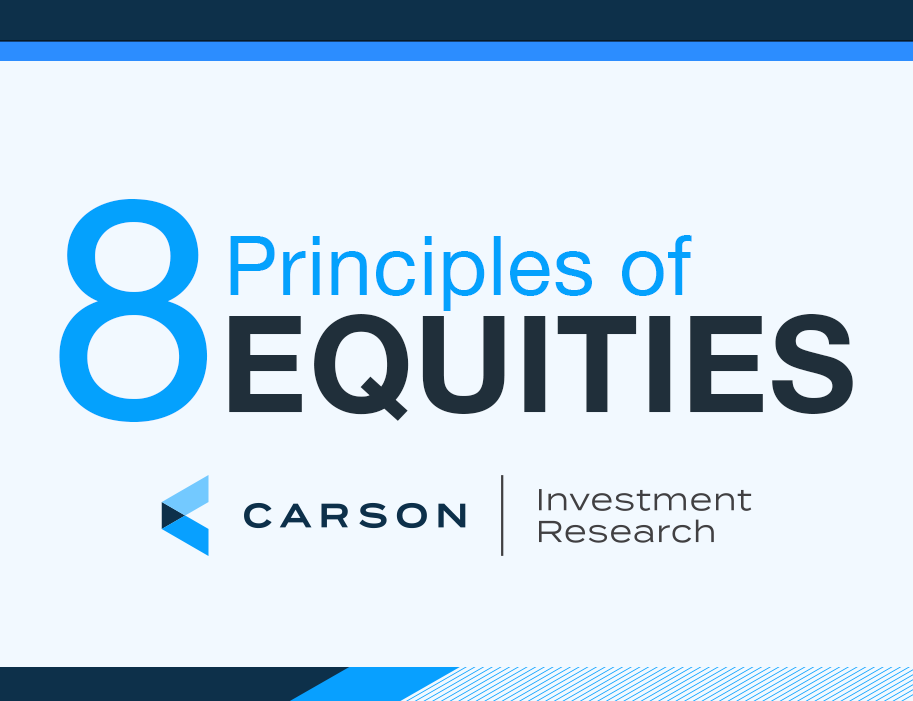The stock market is many things:
- It is the greatest wealth creator known to humanity
- It funds some of the most innovative companies in the world
- It changes lives
- It is intensely competitive, humbling even the sharpest minds
There are many ways and styles to navigate this beautiful yet treacherous terrain. One is not always better than the other. However, these are the eight principles that govern our attitude, style, and focus for the greatest prediction machine ever known – the stock market.
Why 8? This is a special number for the Carson Equity team. In numerology, 8 symbolizes wealth, abundance, and achievement. It also represents the ability to make decisions. In some cultures, it’s considered a lucky number. But, if you flip it on its side, it becomes ∞, the symbol for infinity, representing the long-time horizon that these assets are valued upon and the duration that all great companies aspire for. All of these are important characteristics of compounding wealth in equities.
- Nothing beats long-run equity returns.
Not bonds. Not housing. Not gold, oil, or copper. Frankly, it’s not even close. Sure, there are periods of exception, but they haven’t lasted long. Whether 200 years, 100, 50, or 25, no other asset class has generated as much wealth as the stock market.
- The stock market is built to recover.
It’s seen wars, recessions, depressions, pandemics, terrorist attacks, and speculative bubbles. Some of these have caused nasty declines that lasted years. Yet, not only did the stock market recover from the worst drawdowns in its history, but it did so in dramatic fashion. Human ingenuity and capitalism are a powerful combination that has stood the test of time. Permabears beware.
- Reward takes risk.
But doesn’t everything good in life? Stocks are volatile, which is just one aspect of risk. There are many types, but arguably the most significant risk is the permanent loss of capital due to not having a plan. The stock market can be a wealth-generation machine but humbles even the brightest.
- Patience & perspective pays.
The stock market is a reflection of human emotion. It can bring joy and pain, fear and hope, pride and shame, anger, and comfort. Staying grounded and managing these inevitable emotions are key to compounding wealth over the long term, which of course, takes a long time.
- Respect the market’s complexity.
Sometimes it seems like equity investing is so easy that a cave dweller can do it. Innovations like online trading, ETFs, passive and factor investing, etc., have greatly benefited our industry and helped democratize access to this excellent wealth machine. However, investing is hard. Don’t oversimplify it. While there are many ways to make money in the market, it’s never as easy as saying “High P/E. Sell” or “Quality. Buy.” Even if we choose to ignore its complexity, respect that it is there.
- Stocks are forward-looking.
Apologies to all chartists, technicians, and quants, but equities represent the present value of a company’s future cash flows. Unlike bonds, stocks don’t expire, so their future can be a long time. Predicting tomorrow isn’t easy, but accurately forecasting coming years and even decades is near impossible. This is why stocks are so volatile and why some gyrate more than others – the market believes that certain stocks have clearer futures. Equities care little about yesterday.
- Fundamentals lead, but price matters.
Fundamentals drive long-term returns, but the price you pay matters. Some of the most significant investment errors are forgetting one without the other. Many value managers lead with “cheap” but fail to acknowledge a compromised business. Growth managers can be guilty of buying “growth at any price” only later to realize sharp losses as future expectations become grounded. A good company doesn’t always equal a good stock; a struggling firm can bring handsome rewards.
- Match numbers with narrative.
Equity investing is more than numbers, charts, and equations. Instead, these are helpful tools to understand where a company or sector has been and, more importantly, where it may be going. Investing in narratives alone can be dangerous. However, it can be constructive if matched against numbers. Expressing a thesis with both a story and math helps keep investors honest, especially when considering the pros and cons of any decision.
In the future, Carson Investment Research will dig deeper into these eight principles to provide greater detail and context. Additionally, these will be woven throughout our future discussions on the overall market, sectors, styles, and individual companies. Our goal is to educate and stimulate minds to provide a foundation for successful equity investing.


